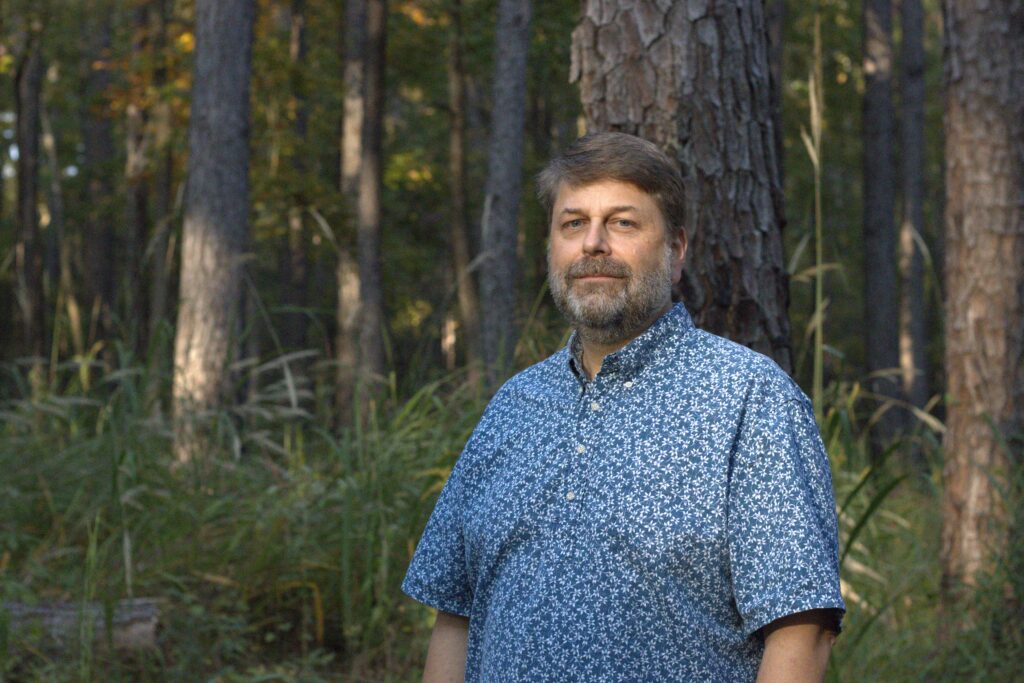Lepczyk wins Provost Award for Faculty Excellence in Research Mentoring
 Patience, self-reflection and curiosity are what College of Wildlife, Forestry and Environment’s (CFWE) Alumni Professor Christopher Lepczyk lists as the recipe for a strong research mentor.
Patience, self-reflection and curiosity are what College of Wildlife, Forestry and Environment’s (CFWE) Alumni Professor Christopher Lepczyk lists as the recipe for a strong research mentor.
And he should know, as he recently earned Auburn University’s Provost Award for Faculty Excellence in Research Mentoring. This award honors faculty whose commitment to undergraduate and graduate students’ research goes above and beyond.
Fostering independent thinking
Being at a large R1 land-grant university like Auburn, research is part of a faculty member’s mission. Lepczyk feels like “undergraduate students are really where faculty can help encourage that independent thought and get to work with students in a way you cannot in a big class.”
The ecologist sees undergraduate research as a student’s potential career pathway or as an important gateway to graduate school. Either way, conducting research enables undergraduate students to explore research topics and decide if the process is of interest to them.
“Helping students participate in research provides an opportunity for faculty to foster self-learning and answer questions independently. Research often does not work, which is for the best, as not all real-world things go as expected,” said Lepczyk.
Lepczyk sees supporting undergraduate research as a way of giving back — as his own experience led him to his career in academia.
“It’s an opportunity to explore and do creative work that is more hands-on and less structured,” said Lepczyk.
Ingredients of a research mentor
The research process often takes longer than anticipated, so Lepczyk identifies patience as an essential characteristic of a strong research mentor.
“Learning and training takes a lot of time, and every student is different,” said Lepczyk.
Self-reflection is high on Lepczyk’s list as well.
“There’s no such thing as normal or typical. It takes self-reflection to realize all students have great potential and abilities,” he said.
Lastly, he shared both mentor and mentee need to be curious and interested. He enjoys working with students who ask questions and stay committed because it takes time to do research well.
“Allie Foster is a good example of this,” said Lepczyk, reflecting on one of his students. “It took years — and a lot of perseverance — to get her project done. But she was trying to do something no one had attempted in 20 years.”
Past mentors informing today
Lepczyk attended a liberal arts college where the majority of students were engaged in undergraduate research as it was part of the curricula. There, he worked on research with a husband-and-wife ecologist team.
“I had good mentors who were focused less on outcomes and more on experience,” he said. “They offered patience.”
Lepczyk also took lessons from his graduate school mentor, noting what worked and what did not.
“He was hands-off and gave us a lot of opportunities,” he said. “I appreciated the things I had to learn to do on my own. If I went down roads that did not work, he was supportive.”
Lepczyk fondly reflects on these relationships, which are still active today.
Students appreciate his investment
Talking to Lepczyk’s past students easily demonstrates how his relationships with his undergraduate and graduate mentors shaped his mentoring philosophy.
“He’s still a valued mentor post-graduation,” said Foster, who is currently a master’s candidate in the School of Forest Resources at the University of Maine, thanks to Lepczyk’s encouragement.
“He was so helpful from the beginning, asking what I wanted to get out of the research, and he continues to be invested in how things are going for me,” Foster said.
Lepczyk recently met Foster at a national conference to help her revise her research paper for publication. The paper has now been published online, and Foster has presented her research at a few conferences.
CFWE doctoral candidate Vasavi Prakash worked with Lepczyk during her academic journey.
“One of the qualities I appreciated most was his balance of guidance and autonomy,” said Prakash. “While he was always available to clarify complex topics and offer insight, he encouraged me to take the initiative and explore my own ideas.”
Prakash credits Lepczyk’s approach with teaching her resilience and confidence in her research abilities and with making their collaboration feel like a shared adventure.
“I realize I was fortunate to have a mentor who invested in my academic success and genuinely cared about my personal growth,” said Prakash. “He has set a high bar for what I hope to offer to others.”
Unique approach to student learning
Lepczyk considers this honor a recognition of his career of giving students opportunities. In fact, he has been helping students become interested in conducting research for almost 25 years.
“To me, it’s recognition of helping students find a pathway forward and hopefully learning to love science and research,” he said, “of understanding where students are at and where they want to go.”
In his nomination, CFWE Associate Dean of Research Daowei Zhang noted Lepczyk, “has a unique ability to motivate and install values beneficial to undergraduate and graduate students.”
The “unique ability to motivate” Zhang identifies is right in line with Lepczyk’s mentorship approach.
“I am much less focused on disciplinary kind of work — I do that, but I am more interested in asking questions first,” he said. “I hope the exposure and experience my students have builds a more well-rounded individual.”
(Written by Amy Burtch)









